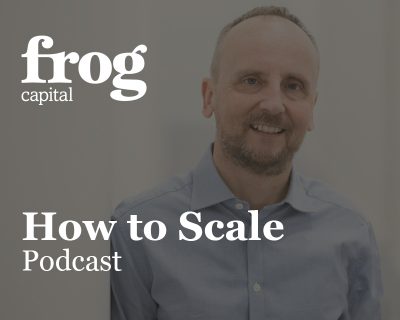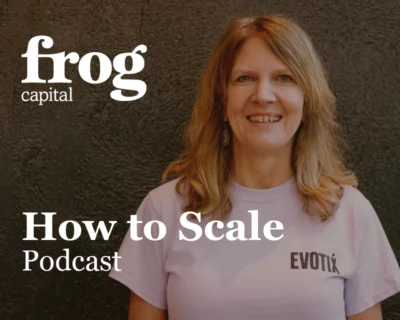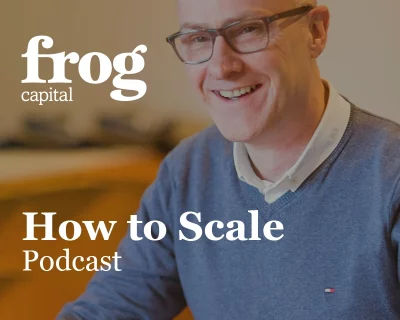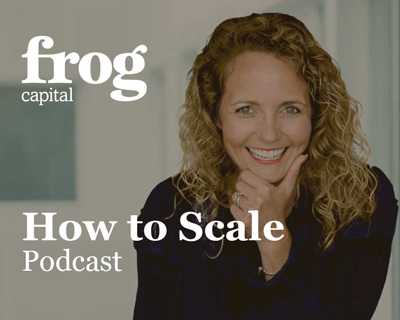The purpose of organisation structure is to order your resources in such a way that you are able to deliver your strategy. According to John, “most businesses have structures that lag behind their strategy and have the net effect of slowing down progress against plan. Getting the structure right is like taking the hand brake off”. There are other structures besides hierarchy, but it is the dominant form and the default approach for CEOs as businesses grow.
The traditional approach suggests that to maintain cohesion, evolution needs to be replaced with design to ensure an appropriate outcome. Founders need to loosen control and delegate within an organisational structure to provide the capacity and drive necessary to adapt and succeed.
Autonomous organisations
Frederic Laloux has challenged this orthodoxy in his book “Reinventing Organisations”. He suggests that the concentration of power and decision-making at the top of a hierarchy brings with it problems, as power is seen as a scarce commodity worth fighting for. This situation invariably brings out the worst of human nature: politics, mistrust, fear, and greed.
According to Laloux, orthodox organisations are built on the assumption that people cannot be trusted to act in the organisation’s best interest without supervision. In contrast, his ideal organisation is built on a foundation of mutual trust. He concludes that if workers and employees are seen as reasonable people that want to do good work and can be trusted to do the right thing, very few rules and control mechanisms are needed, and employees are energised to do better. This leads to self-management without hierarchy.
This is a challenging approach, and many good examples are provided to show it can work in practice, but the businesses are generally mature businesses in mature industries with stable workforces. The predictability of the challenges ahead and the continuity in the people facing the challenge are suited to collaborative enterprise and evolving solutions.
In a fast-growing company facing new market challenges, it is hard to see how this approach could keep up, however there are still lessons to be learnt.
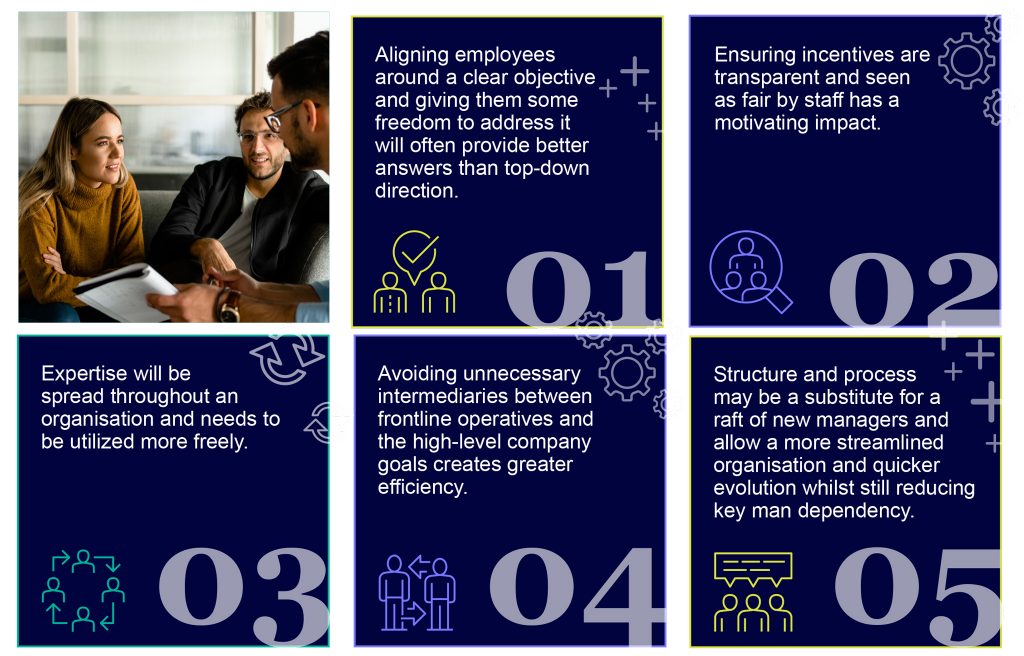

The downside is clearly the risk of resources not being aligned with a strategy adapting to a fast-paced market and rapid change of scale. Board level decisions on strategy could permeate only slowly though an organisation where effectively everyone has to be persuaded of the merit of the changes it requires. In a slow-moving industry this challenge might be helpful to fine tune the strategy, in a growth stage company it will leave you well behind the competition and could be terminal.
Organisational Purpose
A solution to getting the best of autonomous organisations within a proper governance structure but with less need for hierarchical structures is the idea of Organisational Purpose, defined according to a white paper from the Chartered Management Institute* as:
“An organisation’s meaningful and enduring reason to exist that aligns with long-term financial performance, provides a clear context for daily decision making and unifies and motivates relevant stakeholders.”
Purpose provides the “why” behind the “what” of the company vision and the “how” of the mission.
Organisational purpose should be built on 5 key principles:
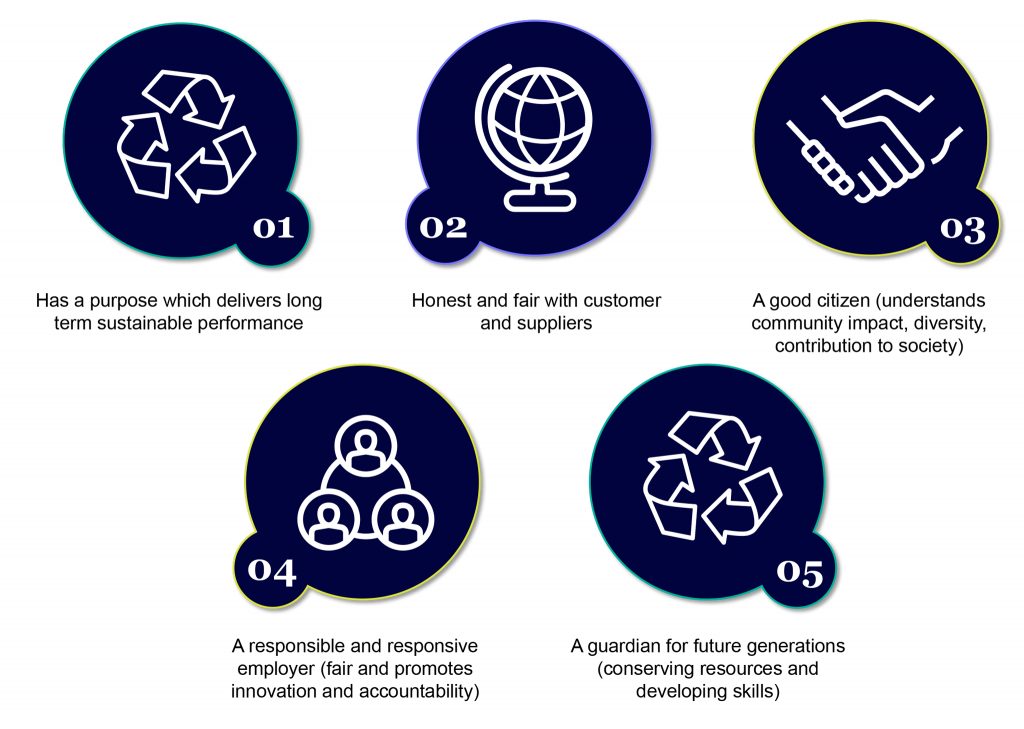

Aligning the organisation’s purpose
This approach seems to have all the benefits of an autonomous organisation without the obvious risks. Purpose provides alignment for stakeholders whilst also informing daily decision making which reduces the need for management direction. Geoff McDonald, ex VP of HR at Unilever is quoted* as saying “Purpose is bringing a sense of meaning to the organisation”.
Much of the research on Organisational Purpose to date has been conducted on larger organisations but the principles seem to me to be a perfect fit for growth stage investing in software companies. So many companies are started by founders with complete clarity of purpose, but they need help to scale that up into a sustainable business model. John Rosling, CEO of Contexis says* “there is a link between purpose and autonomy … purpose creates some real clarity and therefore some real agility”.
Building an aligned agenda so that the growing group of senior management individuals are focused on the Organisational Purpose, and not personal ambition, is critical to workforce motivation and company success for a growing company. This required mindset is why many people from large organisations, focused on hierarchical career progression, are unsuited to working in smaller growth phase companies.
Many people confuse purpose for vision, mission or strategy. To know if you have a clear purpose ask the following questions:
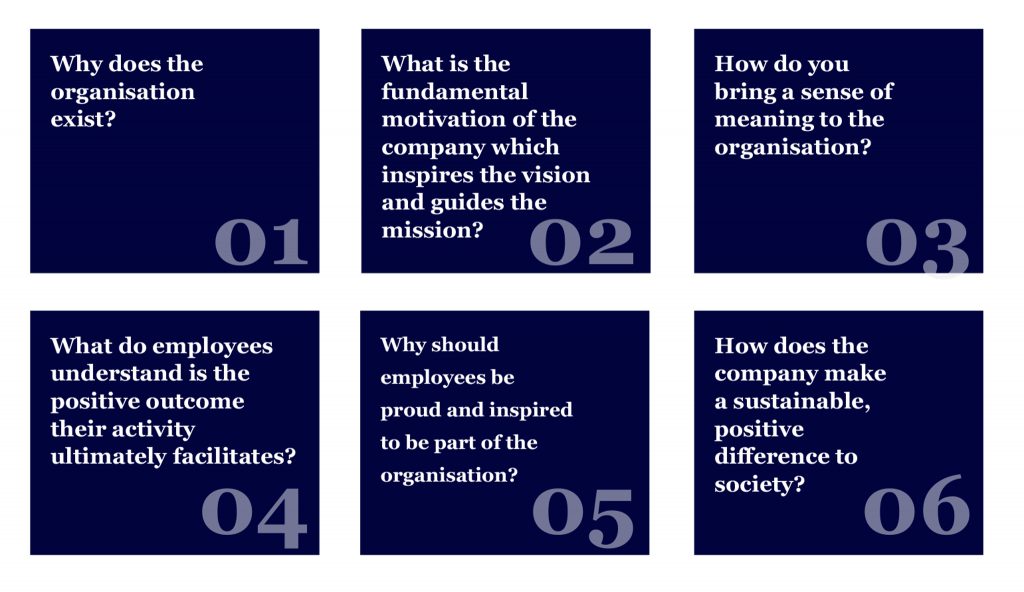

John Sutherland writes:
“Your organisation has a leading principle and part of the leadership task is to clarify what it is and how it gets expressed through your objectives and the way you operate, organize and scale. Some have a leading principle about hierarchy, others around profit, still others around IP or customers or a potential Exit event. A new breed of organisations have a leading principle around purpose, and this provides the core of their DNA. When scaling your organisation having clarity about your leading principle (the one that comes first) will enable you to find the right place for all the other priorities you need to deliver on. In the case of Frog Capital, the leading principle is scaleup, and this provides the DNA for their investment and portfolio management thesis.”
There is more work to be done on Organisational purpose, but it would be hard to argue that a company abiding by the 5 key principles would not increase its chances of long-term success, we certainly believe that at Frog, both for our portfolio companies and our own business.
The attached toolkit includes a set of useful insights to know whether your current organisation could benefit from an autonomous approach and whether your scale-up business is on the right track to having a clear purpose.




